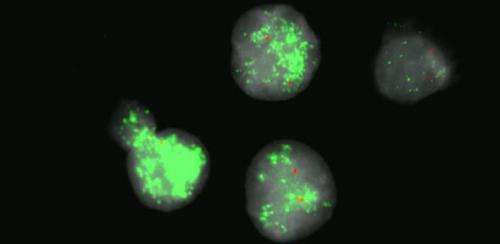Oesophageal cancer gene identified

(Medical Xpress)—A newly-discovered gene linked to oesophageal cancer holds the promise of new treatments for this notoriously difficult-to-fight disease.
Researchers believe drug therapies based on their discovery could help up to 15% of the 8,500 people diagnosed with oesophageal cancer in the UK every year. The study, by scientists from the University of Cambridge, is published in the Journal of the National Cancer Institute.
With the advance of DNA sequencing, researchers are increasingly able to identify genes associated with diseases. Unfortunately, more often than not the function of the gene is unknown, making it difficult to develop a treatment based on the discovery.
The new Cambridge research found not only that the TRIM44 gene plays a key role in the development of oesophageal cancer but also discovered how the gene drives the disease. The new research reveals that over-expression (when there are multiple copies) of TRIM44 leads to higher activity of the mTOR gene, which regulates cell growth and division - processes that become uncontrolled in cancer.
"We know how effective treatments targeting the over-expression of genes can be – just look at the success of Herceptin for breast and stomach cancer," said Professor Rebecca Fitzgerald, lead author of the research from the MRC Cancer Unit at the University of Cambridge. "As there are already a number of drugs which target mTOR, we are hopeful that our discovery could lead to new treatments within the next five years."
The researchers have already found that when they treat tumours in mice which are over-expressing TRIM44 with mTOR inhibitors, they reduced in size. Interestingly, they have also performed the same experiments with cells from human breast cancers, and found the same results, indicating that these findings could also be applied to other cancers.
Professor Fitzgerald added: "For cancer of the oesophagus, and other cancers such as breast cancer, when the TRIM44 gene is over-expressed, it can also be used to indicate the likely response of an individual to an mTOR inhibitor drug. By tailoring the treatment to the individual, we increase the chance that it will be effective at fighting the disease."
Oesophageal cancer is the ninth commonest cancer in the UK, and the sixth most common cause of cancer death. Many people are unaware of cancer of the oesophagus and symptoms are often ignored. As a result, the disease is frequently at an advanced stage when it is diagnosed. Only around 15% of people diagnosed with oesophageal cancer are alive five years later.
More information: The paper, "Amplification of triM44: Pairing a Prognostic target With Potential therapeutic Strategy," is available online: jnci.oxfordjournals.org/conten … dju050.full.pdf+html















